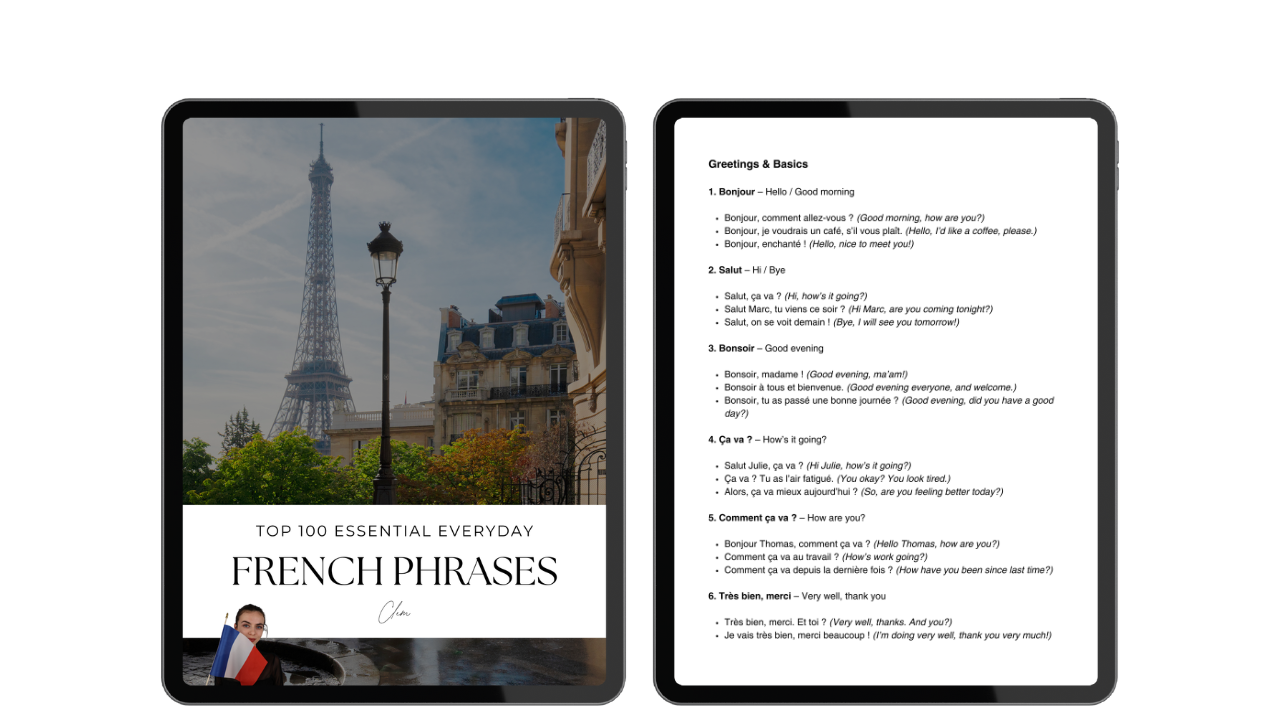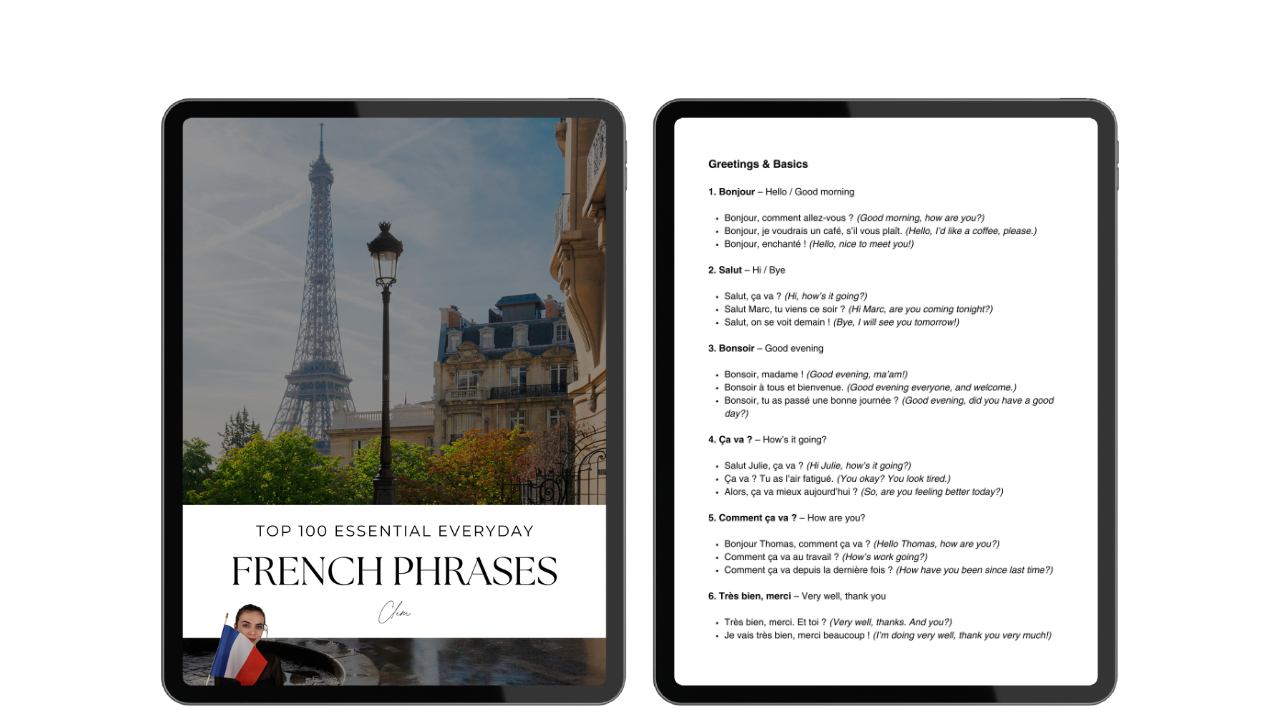
Boring Adjectives? Upgrade Them With These French Alternatives
Nov 09, 2025You know the feeling. You’re trying to write or speak in French, and every time you reach for “bon”, “intéressant”, “beau”, or “mauvais”, it all starts to sound a bit… dull. These words work, sure, but they lose impact when overused.
What if, instead, you had a toolbox of fresh, precise, colorful French adjectives that electrify your speech or writing? That’s exactly what I want to help you with today.
In this post, I’ll show you how to ditch the boring defaults and upgrade your French adjectives. I’ll explain why variety matters, give you dozens of more vivid options (with tips on what contexts they shine in), and show you how to deploy them naturally (without sounding like you’re showing off). By the end, your French will feel richer and more expressive. Let’s go.
Why Boring Adjectives Are a Problem (But Also an Opportunity)
First, let’s admit it: there’s nothing wrong with words like bon, intéressant, mauvais, beau, or bien. These are foundational words. You need them.
But the trouble comes when they become your only adjectives. If every sentence has bon, mauvais, or intéressant, your text or speech flattens out. You lose nuance, energy, personality.
Also, using the same adjective all the time telegraphs that you haven’t thought deeply about what you’re describing. Choosing a more precise or evocative word shows the listener or reader that you care, that you see subtleties. It helps your communication feel alive.
So the fix isn’t to abandon bon or mauvais — it’s to use them selectively, while sprinkling in alternatives that bring flavor, clarity, and emotional color.
What Makes a Good Alternative Adjective?
Before I give you examples, here’s what to aim for when selecting upgraded adjectives:
- Precision
Instead of “interesting,” you might choose “captivant,” “fascinant,” or “stimulant” — each implies a slightly different shade of interest. - Connotation
Be aware of the emotional tone: émouvant (moving), terrifiant (terrifying), serein (serene) carry distinct vibes. - Register
Use “high registers” (formal, literary) when writing or in serious conversation (exquis, inouï, mémorable). Use more colloquial ones (sympa, chouette, génial) in casual contexts. - Gender and number agreement
Always check that adjective matches the noun’s gender (masculine/feminine) and number (singular/plural). That’s a rule you can’t skip in French. - Naturalness
Don’t force a flashy word where a simple one works. Sometimes bon or mauvais is the right choice. The idea is to expand your palette, not to show off.
Replacing “Bon / Bien / Très bon” with Stronger Alternatives
One of the most abused combos in French is “très bon / très bien”. In English, we lean on “very + adjective” so heavily it becomes a crutch. In French, you can often replace “très + X” with a single adjective that carries the same strength.
Here are some alternatives to “très bon / très bien” (or to bien / bon more generally).
- formidable — outstanding, wonderful
- merveilleux / merveilleuse — marvelous
- génial / géniale — great, brilliant
- excellent / excellente — excellent
- extraordinaire — extraordinary
- fantastique — fantastic
- magnifique — magnificent, splendid
- épatant / épatante — splendid, amazing (slightly colloquial)
- remarquable — remarkable
- exceptionnel / exceptionnelle — exceptional
- inouï / inouïe — unheard-of, unbelievable
- impeccable — impeccable
- superbe — superb
- admirable — admirable
- chouette / chouette — nice, cool (friendly tone)
Examples in context:
- Au lieu de « un très bon film », tu peux dire un film excellent ou un film formidable.
- Plutôt que « ça va très bien », tu pourrais dire je vais superbement bien ou simplement je vais génial (in casual conversation).
- Si tu veux saluer un travail, en lieu de “ce rapport est très bon”, tu pourrais écrire : ce rapport est remarquable ou remarquable et complet.
These choices immediately feel more intentional and expressive.
Upgrading “Intéressant” / “Captivant” / “Amusant”
You probably use intéressant a lot, and there’s nothing wrong with that. But here are richer or more precise options that can help you convey what kind of interesting you mean:
- captivant / captivante — captivating, riveting
- fascinant / fascinante — fascinating
- stimulant / stimulante — stimulating
- intriguant / intriguante — intriguing
- passionnant / passionnante — engrossing, compelling
- enrichissant / enrichissante — enriching
- inspirant / inspirante — inspiring
- éclairant / éclairante — enlightening
- saisissant / saisissante — striking
- attachant / attachante — endearing, appealing
- divertissant / divertissante — entertaining
- drole / drôle — funny (with context)
- original / originale — original, unusual
Examples:
- “Ce livre est captivant du début à la fin.”
- “Ton projet est vraiment stimulant.”
- “J’ai trouvé cette idée fascinante.”
- “Le documentaire était saisissant.”
Each of those takes you beyond “intéressant” and gives more nuance to how something interests you.
Alternatives to “Beau / Jolie / Magnifique”
When you want to describe beauty, aesthetics, or pleasing appearance, beau / jolie are solid, but they can fall flat with overuse. Here are some elevated (or just more varied) alternatives:
- magnifique — magnificent
- splendide — splendid
- superbe — superb
- ravissant / ravissante — delightful, charming
- éblouissant / éblouissante — dazzling
- somptueux / somptueuse — sumptuous
- séduisant / séduisante — enticing, attractive
- resplendissant / resplendissante — resplendent
- charmant / charmante — charming
- gracieux / gracieuse — graceful
- élégant / élégante — elegant
- pittoresque — picturesque
- éclatant / éclatante — brilliant, radiant
- radieux / radieuse — radiant
- affriolant / affriolante — alluring (with a playful nuance)
Examples in use:
- “Elle avait un sourire éblouissant.”
- “La maison est splendide sous le coucher du soleil.”
- “Ton style est vraiment charmant.”
- “Le paysage est pittoresque et serein.”
These give more emotional or visual color than just beau or joli.
Alternatives to “Mauvais / Mal / Nul / Horrible”
It helps to have a richer toolbox when you need to criticize or describe something negative. Here are stronger, more precise adjectives (and some gentler ones) you can use:
- médiocre — mediocre
- lamentable — deplorable, pitiful
- désastreux / désastreuse — disastrous
- déplorable — deplorable
- terrible — terrible
- épouvantable — appalling
- horrible — horrible
- affreux / affreuse — awful
- atroce — atrocious
- détestable — detestable
- scandaleux / scandaleuse — scandalous
- inacceptable — unacceptable
- fâcheux / fâcheuse — unfortunate
- cruel / cruelle — cruel
- catastrophique — catastrophic
- pitoyable — pitiful
- décevant / décevante — disappointing
Examples:
- “Le film était médiocre, sans intérêt réel.”
- “C’était une décision lamentable.”
- “Le service ce soir était horrible.”
- “Le comportement était inadmissible.”
These let you speak with stronger voice when the situation calls for it — without defaulting to just mauvais or nul.
Adjectives to Describe Mood, Atmosphere, or Sensation
When describing feelings, ambiance, or sensory experience, here are adjectives that carry more emotional or atmospheric force:
- serein / sereine — serene, calm
- tranquille — tranquil, peaceful
- émouvant / émouvante — moving, touching
- mélancolique — melancholic
- nostalgique — nostalgic
- énergique — energetic
- vivifiant / vivifiante — invigorating
- réconfortant / réconfortante — comforting
- oppressant / oppressante — oppressive
- intense — intense
- palpitant / palpitante — thrilling, pulsating
- aérien / aérienne — airy, light
- poignant / poignante — poignant
- mystérieux / mystérieuse — mysterious
- mélodieux / mélodieuse — melodious
Examples:
- “Cette mélodie est mélancolique mais belle.”
- “Le ciel était serein ce soir.”
- “C’était un moment palpitant.”
- “L’atmosphère était oppressante dans la salle.”
Using these helps you evoke a mood, not just state a fact.
Smart Tips for Using Upgraded Adjectives Naturally
It’s not enough just to know new adjectives. To make them stick and feel natural, keep these tips in mind:
1. Use them in context, not in isolation
Pick a noun or scene and try, “Cette rue est pittoresque, faut que je la photographie.”
You’ll retain them better when they’re tied to your life.
2. Don’t overdo it
You don’t have to replace every “bon / beau / intéressant / mauvais” with something flashy. Sometimes simple is better. Use upgraded adjectives when you want emphasis or color.
3. Pay attention to register
If you speak formally or write, favor words like formidable, éloquent, saisissant. In casual chat, génial, chouette, super often works better.
4. Learn gender/number forms
When you learn a new adjective, note its masculine, feminine, singular, and plural forms — especially irregular ones.
5. Listen and read
Notice adjectives native speakers choose in books, articles, podcasts, songs. That helps you sense which words “feel right” in different settings.
6. Practice combinations
Pair adjectives you like with nouns and verbs: “un spectacle captivant,” “une nuit mystérieuse,” “une musique apaisante.” The more you use them, the more they live in your brain.
7. Revisit the classics
Don’t discard bon / mauvais / intéressant / beau. Instead, let them be part of your toolset. Sometimes un bon moment is entirely appropriate.
Putting It All Together: Sample Phrases & Comparisons
Let me show you side-by-side before/after examples so you can see the impact.
- Avant : C’est un bon film.
Après : C’est un film formidable. - Avant : Le paysage est beau.
Après : Le paysage est éblouissant ou pittoresque*. - Avant : Ton idée est intéressante.
Après : Ton idée est captivante ou fascinante*. - Avant : Le repas était mauvais.
Après : Le repas était lamentable ou déplorable*. - Avant : J’ai passé une soirée sympathique.
Après : J’ai passé une soirée agréable ou enrichissante*. - Avant : C’était un discours bien fait.
Après : C’était un discours éloquent ou percutant*.
Each “after” feels more vivid, expressive, intentional.
Why Upgraded Adjectives Help You In Real Life
You might wonder: “Do native speakers really use éblouissant, palpitant, fascinant every day?” Well, yes — in certain contexts. In writing (blogs, fiction, journalism) and in speeches, they absolutely do. In casual talk, they blend in among simpler phrases, but their impact is felt when used naturally.
By expanding your repertoire:
- You sound more fluent and confident, because you’re not stuck on a small handful of adjectives.
- You express yourself more precisely, capturing subtle shades of meaning.
- You make your French more memorable — people notice when your vocabulary has flavor.
- You grow a linguistic sense — you internalize which words suit which tone, context, or nuance.
A Few Bonus Adjective Categories & Examples
Here are extra adjectives by theme for inspiration. Use them when context demands more color.
Shape / Size / Scale
- gigantesque — gigantic
- minuscule — tiny
- considerable — considerable
- infime — infinitesimal
- énorme — enormous
- vaste — vast
Temperature / Sensation
- brûlant / brûlante — burning, blazing
- glacial / glaciale — icy, glacial
- torride — scorching
- froid / froide — cold (but you can instead say glacial, gelé)
- tiède — lukewarm
Sound / Voice / Music
- mélodieux / mélodieuse — melodious
- retentissant / retentissante — resounding
- suppliant / suppliante — pleading
- tonnant / tonnante — thunderous
Light / Color / Brightness
- étincelant / étincelante — sparkling
- resplendissant / resplendissante — resplendent
- éclatant / éclatante — radiant, dazzling
- chatoyant / chatoyante — shimmering
- lumineux / lumineuse — luminous
Time / Experience / Memory
- inoubliable — unforgettable
- mémorable — memorable
- éphémère — fleeting
- durable — lasting
- ancien / ancienne — former, old (in sense of past)
Use these when describing scenes, stories, feelings, or atmospheres. They help transform bland descriptions into something evocative.
How to Work These Into Your Daily French Practice
Here are some practical ways to make upgraded adjectives part of your active vocabulary:
- Adjective a day
Pick one new adjective per day (plus its forms). Use it in sentences, conversations, writing. - Journal writing
When writing in French (a diary, blog, message), challenge yourself to replace at least one “bon / intéressant / beau / mauvais / bien” with a stronger alternative. - Reading with attention
Whenever you read French texts (articles, stories, blogs), highlight adjectives you like. Look them up, note their usage, and try to use them. - Speaking exercises
When talking about your day, choose expressive adjectives: “Ma matinée était paisible,” “Le film était saisissant.” It helps you habitually choose richer words. - Flashcard pairs
Pair a common adjective with its upgraded alternative (ex: bon → exceptionnel, beau → éblouissant) and test yourself. - Synonym hunts
When writing or speaking, if your mind goes to bon / beau / intéressant, pause and think: “What’s a better word I could use?” Then pick one from your mental list or dictionary. - Peer feedback
If you have a language buddy or tutor, ask them: “Does this word feel natural?” or “Would native speakers use éblouissant here, or stick with beau?”
Over time, what feels special now will feel normal. Your “upgraded” adjective list becomes your default palette.
Boring adjectives aren’t your fault — they’re just the default. Every learner leans on them because they’re safe, known, and always “right.” But your voice — your unique perspective, emotions, experience — deserves more language to express it. Upgrading your adjectives is one of the most powerful ways to make your French come alive.
Don’t rush. Start by swapping one adjective here and there. As you get comfortable, you’ll spot moments where you can go bold — une journée éblouissante, un projet saisissant, un contraste surprenant. Over time, your French will become more you.












